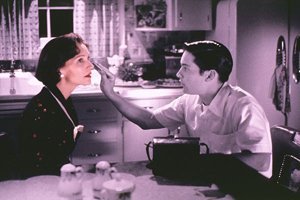Pleasantville
Nothing is as simple as Black and White.

|
In Pleasantville it is always sunny, dinner is always on the table and the firemen are only there to get cats out of trees. Everything is, well, pleasant. David (Tobey Maguire) and his sister Jen (Reese Witherspoon) are not. He is a lonely teenager obsessed with the cult soap Pleasantville and she is a high school flirt whose only desire is to become popular. When they break their television remote control in an argument, a mysterious TV repairman is on hand to supply a brand new one with a little more 'oomph' to it. As a result, brother and sister find themselves trapped in the 1950s monochrome utopia that is the world of Pleasantville.
At first horrified at their predicament, David and Jen attempt to fit in. But in a place where sex means holding hands and nobody ever uses the toilet, their modern day attitudes begin to clash with the suburban paradise and the 'pleasant' façade of the town starts to reveal its true nature. Enveloped in repression, the people of Pleasantville start to discover themselves under the guidance of the newcomers. This is stunningly represented by the slow seeping of colour into the black and white world. An apple here, a car there, and suddenly colour is everywhere, revolutionising the sleepy town.
Containing more special effects shots than Jurassic Park, Pleasantville is a superbly shot film whose use of colour and black and white is groundbreaking and breathtaking. Combined with an exquisite soundtrack, including songs by Etta James and Fiona Apple, it is striking in its beauty and subtlety. But Pleasantville is much more than just wonderful to look at, it is also a hilarious pastiche of the 'wholesomeness' of 1950s America, thanks to a superb cast containing William H. Macy, Jeff Bridges and J.T. Walsh, and also an incredibly effective social commentary as the traditionalist founders of Pleasantville fight back against the introduction of colour into their lives.
Pleasantville is a moving tale of innocence lost and freedom gained, an exceedingly inventive premise supported by a fantastic use of understated special effects, and a brilliantly funny satire on what it is to be 'pleasant'. A feel-good film like no other.
Peter Lefort
Pleasantville is a 1950s, black and white TV soap opera about the kind of idealistic world where Father knows best, Mother cooks dinner, and Sister and Brother do all there homework before dinner and set the table without being asked. Where everyone is nice to one another and wash their cars every Sunday afternoon. Where children's misadventures are treated with stern- but kind, fair and morally uplifting- lectures. Where the sun always shines, and birds always sing. You get the picture- the kind of place that could never exist in reality.
And yet the youth of today are strangely drawn to it, and watch repeats of the show on nostalgia cable channels.
David (Tobey Maguire) an average American teenager who's not happy with his life, uses the show as an escape from reality. He and his twin sister Jennifer (Reese Witherspoon) live with their divorced mother- who's never around. One night, a mysterious TV repair man calls round to deliver a remote for their TV set- just as David is settling down to watch a 24hr marathon of #Pleasantville. As he and his sister argue over the remote, they get transported into the show- as Bud and Mary-Sue Parker, becoming black and white, with a perfect all-American family.
David, thrilled with the new situation, fits in effortlessly. Jennifer on the other hand is not at all happy with the situation, and gradually breaks most of the rules of the 'perfect' society. One event leads to another- and suddenly there is a red rose growing in Pleasantville. As more rules are broken, more colour appears in the city, and a more realistic world evolves.
The impact of the gradual introduction of colour into the film is visually astounding. It's hard to describe the impact of seeing one solitary red rose amidst the black and white surroundings- unless you've seen the little girl in red in Schindler's List. There is a reason behind every change in hue, and the gradual evolution from black and white to a vibrant cacophony of colours is stirring- apparently the film necessitated a whole new type of digital special effects.
On a thematic level, there are similarities between Pleasantville and The Truman Show (shown last term). Both deal with reality vs. Unreality, and the importance of individual freedom. Both involve the central characters living their lives on television, with their actions affecting those around them.
Pleasantville has some interesting characters who evolve more as colour enters their lives- Jeff Daniels, a soda shop proprieter, discovers a love of art; and the late J.T. Walsh, as an influential resident, opposes all change. Although on one level, Pleasantville is a highly entertaining piece of cinema, it is also thought provoking- an individual can make a difference, and that life in an alternate reality isn't necessarily better- just different. There's even room for a parable about racism ("No coloureds allowed"). Pleasantville is a satire, a fantasy, and a visual marvel; as well as a wonderful feel-good movie.
Archive
More Information | Back to Previous Schedule | This Season | BBFC Classification Guidelines
Screenings of this film:
| 1999/2000 Autumn Term – (35mm) |
| 1999/2000 Autumn Term – (35mm) |
| 1999/2000 Autumn Term – (35mm) |
| 1999/2000 Autumn Term – (35mm) |
| 2004/2005 Spring Term – (35mm) |


